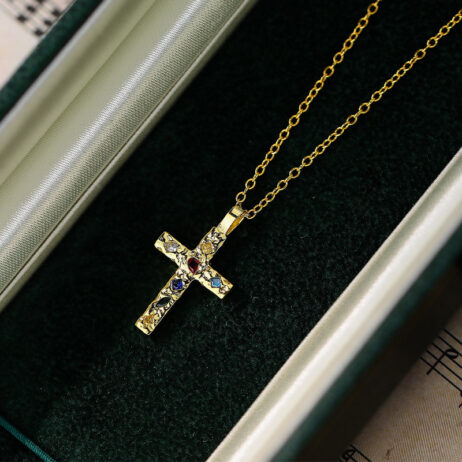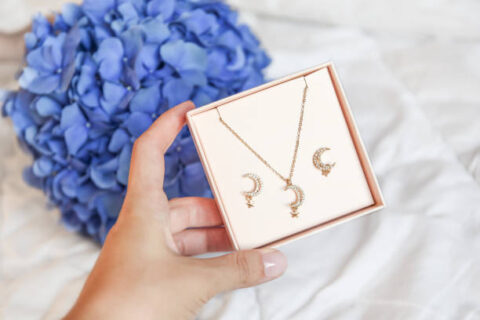What Is the Meaning of the Silver Cross Necklace?
- Posted on
- 0 comments
- by juvarjewelry
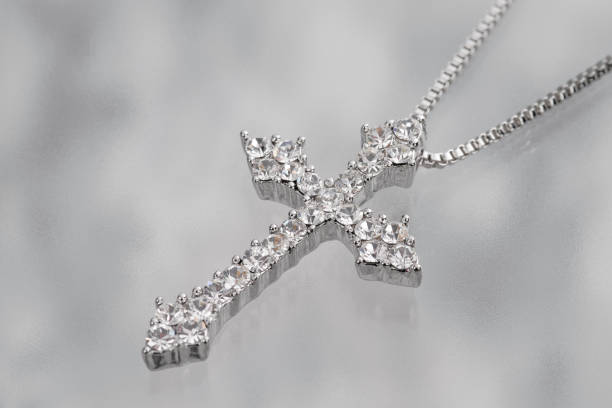
I. Background
The silver cross necklace is a timeless piece of jewelry that transcends its aesthetic appeal to carry profound religious, cultural, and personal significance. Historically rooted in Christian tradition, the cross has been the quintessential symbol of the faith, representing the crucifixion and resurrection of Jesus Christ. The material choice of silver is not arbitrary; it is often associated with purity, clarity, and protection, further enhancing the spiritual undertones of the necklace.
In addition to its religious connotations, the silver cross necklace has evolved into a versatile accessory in the realm of fashion. It is cherished by individuals not only for its beauty but also for the rich symbolism it conveys. As a result, this piece of jewelry is not limited to those of Christian faith but is appreciated across various cultures and personal beliefs. This article aims to dissect the layers of meaning embedded within the silver cross necklace, examining its significance from religious, spiritual, cultural, and personal perspectives.
II. The Religious Significance of the Silver Cross Necklace
Christian Symbolism
Within Christianity, the cross is far more than a simple geometric figure; it embodies the core narrative of the faith. The cross symbolizes the crucifixion of Jesus Christ, an act that Christians believe represents the ultimate sacrifice for the redemption of humanity’s sins. The vertical beam of the cross, pointing towards heaven, and the horizontal beam, stretching out towards the world, together signify the intersection of the divine and the mortal.
The silver cross necklace, when worn, serves as a personal reminder of this pivotal event in Christian theology. It is an outward expression of the wearer’s faith, a daily emblem of their spiritual convictions. For many, the act of wearing a cross is akin to carrying a piece of their religion with them, allowing them to feel a constant connection to their faith and to the figure of Christ.
Moreover, the cross represents themes of suffering, redemption, and the promise of eternal life. These themes are central to Christian doctrine and are embodied in the act of wearing a cross. The silver material further amplifies these themes, as silver is often associated with attributes like reflection and clarity, which can be interpreted as a metaphor for the clear, reflective path of faith.
Expression of Faith
Wearing a silver cross necklace is more than a fashion choice; it is a profound declaration of personal belief. For devout Christians, it serves as a silent testament to their commitment to the teachings of Christ. Whether visible or discreetly tucked under clothing, the necklace is a constant companion that reinforces the wearer’s spiritual journey.
The cross is also imbued with a protective aura. Many believers view it as a shield against evil, a source of divine protection that guards them in their daily lives. This protective quality is especially potent in silver, a metal traditionally believed to have purifying and healing properties. Thus, the silver cross necklace can offer a sense of comfort and security, particularly during moments of hardship or spiritual challenge.
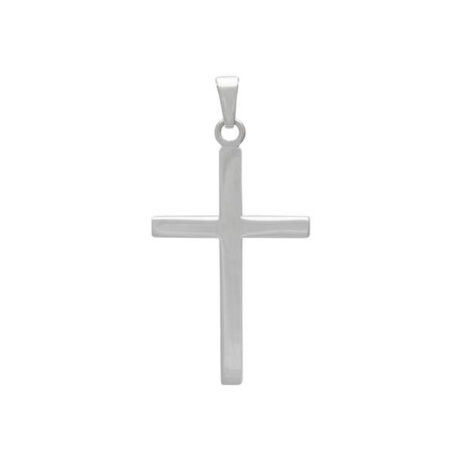
Additionally, the silver cross necklace can serve as a reminder of one’s responsibilities as a follower of Christ. It is a call to live according to Christian values, to practice compassion, forgiveness, and humility in all aspects of life. By wearing the cross, individuals not only affirm their faith but also commit to embodying its principles in their interactions with the world.
III. The Spiritual and Protective Symbolism of the Silver Cross Necklace
The Cross as a Talisman
Throughout history, the cross has been revered not only as a religious icon but also as a powerful talisman believed to ward off evil and protect the wearer from harm. This belief is deeply rooted in Christian tradition, where the cross is seen as a symbol of Christ’s victory over sin and death. As such, the silver cross necklace is often regarded as a form of spiritual armor, offering protection against negative forces, both seen and unseen.
In the context of spiritual protection, silver plays a significant role. Known for its purifying properties, silver has long been associated with cleansing, healing, and the repelling of evil. This metal’s reflective quality is thought to mirror back negative energies, preventing them from affecting the wearer. When combined with the symbol of the cross, a silver cross necklace is believed to offer a potent shield, enhancing the spiritual well-being of the individual.
Source of Spiritual Strength
The silver cross necklace is also a symbol of inner strength and resilience. For many, wearing this necklace serves as a reminder of the spiritual journey they are on and the strength they draw from their faith. The cross represents the trials and tribulations that are inherent in life, and by wearing it, individuals acknowledge these challenges while reaffirming their trust in divine guidance.
In moments of doubt or adversity, the silver cross necklace can provide comfort and reassurance. It serves as a tangible connection to the divine, a constant presence that encourages the wearer to persevere in their faith. The physical act of touching or holding the cross can be a meditative gesture, helping individuals to focus their thoughts and find solace in their spiritual beliefs.
The cross also represents the concept of transformation—an essential theme in Christian spirituality. Just as Christ’s crucifixion led to resurrection and the promise of eternal life, the trials faced by individuals can lead to personal growth and spiritual enlightenment. The silver cross necklace, therefore, is not just a symbol of faith, but a reminder of the transformative power of enduring life’s challenges with grace and faith.
IV. The Cultural and Historical Background of the Silver Cross Necklace
Historical Evolution
The silver cross necklace has a rich history that spans centuries and cultures. Its origins can be traced back to the early Christian era when the cross began to be used as a symbol of the faith. Initially, Christians were persecuted, and the cross was often worn discreetly to avoid detection. As Christianity spread and became more widely accepted, the cross transitioned from a hidden symbol of faith to a public declaration.
In medieval Europe, silver cross necklaces became more prevalent, not only as religious symbols but also as protective amulets. The Crusaders, for instance, often wore crosses made of silver as they believed the metal would protect them in battle and keep them safe during their perilous journeys. Over time, the silver cross necklace became a cherished heirloom, passed down through generations as a symbol of faith, heritage, and protection.
During the Renaissance and beyond, the design of silver cross necklaces became more elaborate, reflecting the artistic styles of the period. They were adorned with intricate engravings, gemstones, and other decorative elements, symbolizing not only religious devotion but also social status. In modern times, while the fundamental meaning of the cross remains unchanged, its design has continued to evolve, making it a versatile accessory that appeals to both religious and secular wearers.
Cultural Variations
The silver cross necklace, while rooted in Christian tradition, has also found a place in various cultures around the world. In Western culture, it is predominantly seen as a symbol of Christian faith, often worn as a sign of one’s religious identity. However, in other cultures, the cross may take on additional meanings or be incorporated into different contexts.
For example, in some Eastern European countries, silver cross necklaces are traditionally given as gifts during important religious milestones, such as baptisms, confirmations, or weddings. These necklaces are often seen as protective charms that safeguard the wearer throughout their life. In Latin America, the cross is sometimes integrated with indigenous symbols, creating a unique fusion of Christian and native beliefs that reflect the region’s complex cultural heritage.
In contemporary fashion, the silver cross necklace has transcended its religious origins to become a popular accessory among people of various backgrounds. For some, it represents a connection to their cultural heritage, while for others, it serves as a stylish statement piece with deep spiritual connotations. This versatility highlights the cross’s enduring significance across different cultures and time periods, demonstrating its ability to adapt while maintaining its core symbolism.
V. The Personal and Sentimental Value of the Silver Cross Necklace
Personal Stories and Emotions
The silver cross necklace often holds deep personal significance, serving as a cherished reminder of loved ones, significant life events, or personal milestones. For many, it is much more than a piece of jewelry; it is a tangible connection to memories, emotions, and relationships that shape their lives.
One of the most poignant ways in which the silver cross necklace is used is as a memorial to honor and remember those who have passed away. Many people choose to wear a silver cross that once belonged to a loved one or that was given to them in memory of someone they’ve lost. This practice turns the necklace into a living tribute, allowing the wearer to keep the memory of the deceased close to their heart. The cross, in this context, becomes a symbol of eternal life and the enduring connection between the wearer and the person they mourn.
Personal stories surrounding the silver cross necklace often highlight its role in representing love, commitment, and the bonds that tie people together. For example, a silver cross given by a parent to a child can symbolize protection, guidance, and unconditional love. Similarly, a cross exchanged between partners can serve as a lasting symbol of their commitment and shared faith, embodying the spiritual and emotional depth of their relationship.
Expression of Sentiment
The silver cross necklace is also a powerful medium for expressing deep emotions, especially when given as a gift. When someone gives a silver cross necklace to a friend or family member, it often signifies more than just a gesture of affection—it represents a shared connection, mutual respect, and a desire to offer comfort or protection.
In the context of friendship, a silver cross necklace can be a symbol of trust and enduring support. It may be given during a time of need or as a token of appreciation, representing the giver’s wish to stand by the recipient in both good times and bad. The act of gifting a silver cross can also be seen as a way to reinforce the spiritual bond between friends, particularly if they share the same faith.
Within families, the silver cross necklace is frequently passed down through generations, carrying with it the stories, values, and beliefs of those who came before. This practice imbues the necklace with a sense of continuity and heritage, making it a symbol of familial love and tradition. When worn, it serves as a reminder of the enduring strength of family ties, connecting the wearer to their roots and the legacy of their ancestors.
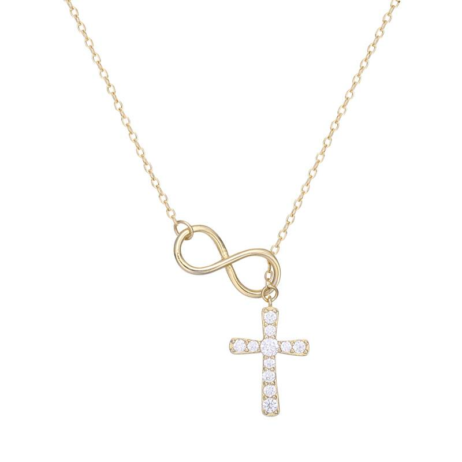
As a symbol of love, the silver cross necklace is often chosen for significant occasions, such as engagements, weddings, or anniversaries. Its timeless design and profound meaning make it a fitting representation of eternal love and commitment. For many couples, exchanging silver crosses can be a deeply meaningful act, signifying their shared faith and the spiritual foundation of their relationship.
VI. The Silver Cross Necklace in Fashion and Personal Expression
Fashion Accessory
In the world of contemporary fashion, the silver cross necklace has become more than just a religious symbol; it is also a versatile and stylish accessory. Its simple yet elegant design allows it to complement a wide range of fashion choices, from casual outfits to more formal attire. The adaptability of the silver cross necklace makes it a popular choice among fashion enthusiasts, who appreciate its ability to add a touch of sophistication and meaning to their look.
Fashion designers and brands have recognized the cross’s iconic status, incorporating it into their collections in various forms—ranging from minimalist designs to bold, statement pieces. This versatility enables the silver cross necklace to transcend religious boundaries, becoming a symbol of personal style that resonates with a broader audience. In this way, the cross maintains its symbolic weight while also functioning as a key element in modern fashion.
In popular culture, celebrities and influencers often wear silver cross necklaces as part of their signature style, further cementing its status as a fashionable accessory. Whether layered with other necklaces for a bohemian look or worn alone for a classic touch, the silver cross necklace continues to be a timeless piece that bridges the gap between fashion and meaning.
Symbol of Individuality
For many, the decision to wear a silver cross necklace goes beyond its aesthetic appeal. It serves as an expression of individuality and personal beliefs. While the cross is universally recognized, the reasons for wearing it can vary widely, making it a deeply personal accessory that reflects the wearer’s unique identity.
Some individuals wear the silver cross necklace as a subtle yet powerful declaration of their spiritual beliefs, even if they do not actively practice religion. For others, it might symbolize a connection to their heritage or a reminder of personal values such as faith, hope, and love. The cross’s universal symbolism allows it to carry different meanings depending on the wearer’s intentions, making it a versatile emblem of personal significance.
Additionally, the choice of silver as the material for the cross often reflects the wearer’s preference for understated elegance and timeless beauty. Silver, with its cool luster and association with purity, complements the cross’s symbolism, making it an ideal choice for those who value both meaning and style in their accessories.
The silver cross necklace also allows individuals to express their spiritual journey in a way that resonates with their personal experiences. Whether worn as a reminder of a significant life event, as a form of protection, or simply as a beloved piece of jewelry, the necklace becomes a part of the wearer’s story, imbued with personal meaning and significance.
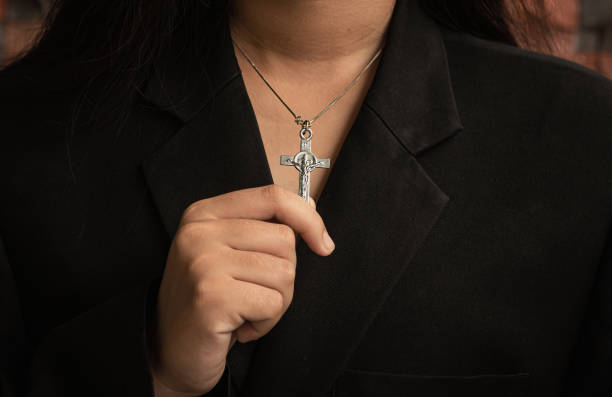
VII. Conclusion
Summary of Symbolism
The silver cross necklace is a multifaceted symbol that embodies deep religious, spiritual, cultural, and personal significance. From its origins as a sacred Christian emblem representing the crucifixion and resurrection of Jesus Christ, it has evolved into a powerful symbol of faith, protection, and personal identity. The silver cross necklace serves as a spiritual talisman, offering comfort and strength to those who wear it. Its historical and cultural journey reflects its adaptability and enduring relevance across different eras and societies.
In modern fashion, the silver cross necklace continues to hold its place as a timeless accessory, cherished for its elegance and versatility. It allows individuals to express their personal beliefs, values, and style in a way that is both meaningful and aesthetically pleasing. Whether as a symbol of faith, a fashion statement, or a personal memento, the silver cross necklace remains a beloved piece of jewelry with a profound and lasting impact.
Personal Reflection
The silver cross necklace, with its rich tapestry of meanings, invites us to reflect on our own beliefs and the values we hold dear. It serves as a reminder that symbols, while rooted in tradition, can take on new and personal meanings as they are embraced by different people. Looking ahead, the silver cross necklace is likely to continue its legacy as a cherished accessory, not only within Christian communities but also as a universal symbol of resilience, hope, and personal expression. Its ability to adapt and remain relevant in a rapidly changing world speaks to its enduring power as a symbol that resonates on both personal and collective levels.

